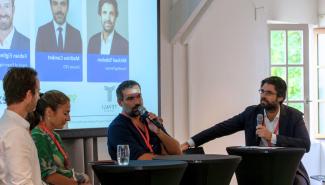Tevali Partners at Solarplaza Summit France: Financing the Future of C&I Solar
Structuring Bankable C&I Solar Portfolios in France: Why Standardization is Key
At the Solarplaza Summit France – PV & Storage 2025, Tevali Partners had the opportunity to contribute to the conversation around one of the sector’s most pressing challenges: making Commercial & Industrial (C&I) solar projects bankable at scale.
During a roundtable moderated by Michael Tobelem, Founding Partner at Tevali, representatives from Crédit Agricole CIB, Helexia and GreenYellow discussed the financial structuring of distributed solar portfolios in a highly fragmented French market.
Fragmentation as Both Challenge and Opportunity
The diversity of the French C&I landscape — in project size, developer profiles, and contractual frameworks — presents a unique paradox. On one hand, this heterogeneity can help dilute risks when aggregating projects into larger portfolios. On the other hand, it makes credit analysis complex, slows deployment, and creates significant hurdles for lenders.
To overcome these barriers, the speakers emphasized the need for standardized contractual structures. Harmonizing PPAs, EPCs, and O&M agreements clarifies risk allocation, improves transparency, and allows for easier replication — all critical steps toward making C&I portfolios bankable.
Off-Taker Quality and Predictable Cash Flows
Another key point of consensus was the central role of the off-taker in securing financing. The financial solidity and creditworthiness of the counterparty remains a primary concern for banks. This is especially true in fragmented markets, where project-by-project assessment is impractical. In response, banks are increasingly favoring platform-based approaches that aggregate multiple assets and assess their viability based on global scoring, rather than on individual characteristics.
Such platforms must strike a delicate balance: they need to be standardized enough to ensure clarity and risk control, yet flexible enough to accommodate different project types and profiles.
The Rise of Hybrid Models
Finally, the panel discussed the growing importance of hybrid financing models and integrated services — including battery storage (BESS), automated consumption control, and energy efficiency features. These additions not only enhance the technical and operational profile of projects but also make them more attractive to financial institutions. Well-documented and structured portfolios can now access financing conditions approaching those of utility-scale assets.
Tevali Partners extends its thanks to Julie Tholliez, Mathieu Cambet, Fabian Eiglier, and Marjory Dupouy for their valuable contributions and the successful coordination of the session.

